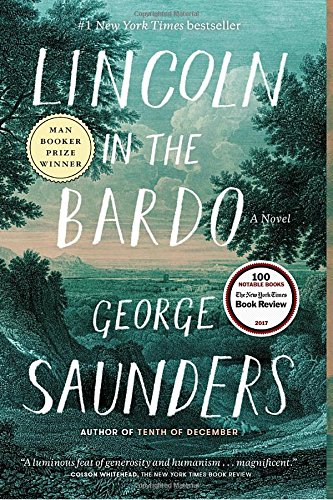This post contains affiliate links. As an Amazon Associate I earn from qualifying purchases
#1 NEW YORK TIMES BESTSELLER • WINNER OF THE MAN BOOKER PRIZE
The long-awaited first novel from the author of Tenth of December: a moving and original father-son story featuring none other than Abraham Lincoln, as well as an unforgettable cast of supporting characters, living and dead, historical and invented
Named One of the Ten Best Books of the Year by The Washington Post, USA Today, and Maureen Corrigan, NPR • One of Time’s Ten Best Novels of the Year • A New York Times Notable Book
February 1862. The Civil War is less than one year old. The fighting has begun in earnest, and the nation has begun to realize it is in for a long, bloody struggle. Meanwhile, President Lincoln’s beloved eleven-year-old son, Willie, lies upstairs in the White House, gravely ill. In a matter of days, despite predictions of a recovery, Willie dies and is laid to rest in a Georgetown cemetery. “My poor boy, he was too good for this earth,” the president says at the time. “God has called him home.” Newspapers report that a grief-stricken Lincoln returns, alone, to the crypt several times to hold his boy’s body.
From that seed of historical truth, George Saunders spins an unforgettable story of familial love and loss that breaks free of its realistic, historical framework into a supernatural realm both hilarious and terrifying. Willie Lincoln finds himself in a strange purgatory where ghosts mingle, gripe, commiserate, quarrel, and enact bizarre acts of penance. Within this transitional state—called, in the Tibetan tradition, the bardo—a monumental struggle erupts over young Willie’s soul.
Lincoln in the Bardo is an astonishing feat of imagination and a bold step forward from one of the most important and influential writers of his generation. Formally daring, generous in spirit, deeply concerned with matters of the heart, it is a testament to fiction’s ability to speak honestly and powerfully to the things that really matter to us. Saunders has invented a thrilling new form that deploys a kaleidoscopic, theatrical panorama of voices to ask a timeless, profound question: How do we live and love when we know that everything we love must end?
“A luminous feat of generosity and humanism.”—Colson Whitehead, The New York Times Book Review
“A masterpiece.”—Zadie Smith
An Amazon Best Book of February 2017: Lincoln in the Bardo is hilariously funny, horribly sad, and utterly surprising. If you can fight past an initial uncertainty about the identity of its narrators, you may find that it’s the best thing you’ve read in years. This first novel by acclaimed short-story-writer and essayist George Saunders (Tenth of December, The Brain-Dead Megaphone) will upend your expectations of what a novel should be. Saunders has said that “Lincoln in the Bardo” began as a play, and that sense of a drama gradually revealing itself through disparate voices remains in the work’s final form.
The year is 1862. President Lincoln, already tormented by the knowledge that he’s responsible for the deaths of thousands of young men on the battlefields of the Civil War, loses his beloved eleven-year-old son, Willie, to typhoid. The plot begins after Willie is laid to rest in a cemetery near the White House, where, invisible to the living, ghosts linger, unwilling to relinquish this world for the next. Their bantering conversation, much of it concerned with earthly — and earthy – pleasures, counterbalances Lincoln’s abject sorrow.
Saunders takes huge risks in this novel, and they pay off. His writing is virtuosic – and best of all, its highs and lows are profoundly entertaining. You may hear echoes of Thornton Wilder, Beckett and even a little Chaucer, but Lincoln in the Bardo is peculiar and perfect unto itself. Some advice: don’t try to read this one in a library. You’ll be hooting with laughter when you aren’t wiping away your tears. –Sarah Harrison Smith, The Amazon Book Review
Audible Annual Paid Membership
Gift of Audible 12-month Membership Plan
Kindle Unlimited 24 Month Paid Membership
Audible PLUS Paid Digital Membership
Gift of Audible 3-month Membership Plan
Gift of Audible 6-month Membership Plan
Gift of Audible 1-month Membership Plan
Kindle Unlimited 12 Month Paid Membership
SNAP EBT Enrollment
Audible PLUS Free Trial Digital Membership
The Drop Text Alerts
Kindle Unlimited 6 Month Paid Membership
Amazon Prime for Young Adults 6-month Trial
Amazon Baby Registry
Amazon Wedding Registry
Amazon Prime Free Trial
Kindle Unlimited Free Trial
Amazon Home Services
Prime Gaming
Amazon Prime Discounted Monthly Offering
Amazon Kids+ Free Trial
Amazon Kids+ Special Promotions
Prime Try Before You Buy First Box Checkout
Amazon Music Unlimited Monthly Subscription
Amazon Music Unlimited Digital Bundle
Amazon Prime Video Free Trial
This post contains affiliate links. As an Amazon Associate I earn from qualifying purchases





